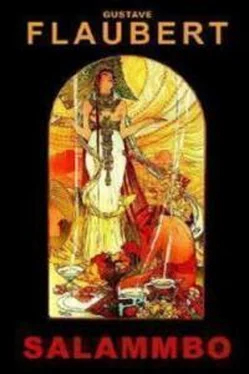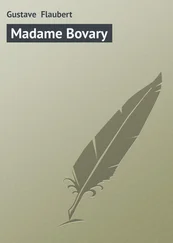The portion of the rampart which extended from the corner of the harbours to the height of the cisterns was broken down. Then the people of Malqua found themselves caught between the old enclosure of Byrsa behind, and the Barbarians in front. But there was enough to be done in thickening the wall and making it as high as possible without troubling about them; they were abandoned; all perished; and although they were generally hated, Hamilcar came to be greatly abhorred.
On the morrow he opened the pits in which he kept stores of corn, and his stewards gave it to the people. For three days they gorged themselves.
Their thirst, however, only became the more intolerable, and they could constantly see before them the long cascade formed by the clear falling water of the aqueduct. A thin vapour, with a rainbow beside it, went up from its base, beneath the rays of the sun, and a little stream curving through the plain fell into the gulf.
Hamilcar did not give way. He was reckoning upon an event, upon something decisive and extraordinary.
His own slaves tore off the silver plates from the temple of Melkarth; four long boats were drawn out of the harbour, they were brought by means of capstans to the foot of the Mappalian quarter, the wall facing the shore was bored, and they set out for the Gauls to buy Mercenaries there at no matter what price. Nevertheless, Hamilcar was distressed at his inability to communicate with the king of the Numidians, for he knew that he was behind the Barbarians, and ready to fall upon them. But Narr' Havas, being too weak, was not going to make any venture alone; and the Suffet had the rampart raised twelve palms higher, all the material in the arsenals piled up in the Acropolis, and the machines repaired once more.
Sinews taken from bulls' necks, or else stags' hamstrings, were commonly employed for the twists of the catapults. However, neither stags nor bulls were in existence in Carthage. Hamilcar asked the Ancients for the hair of their wives; all sacrificed it, but the quantity was not sufficient. In the buildings of the Syssitia there were twelve hundred marriageable slaves destined for prostitution in Greece and Italy, and their hair, having been rendered elastic by the use of unguents, was wonderfully well adapted for engines of war. But the subsequent loss would be too great. Accordingly it was decided that a choice should be made of the finest heads of hair among the wives of the plebeians. Careless of their country's needs, they shrieked in despair when the servants of the Hundred came with scissors to lay hands upon them.
The Barbarians were animated with increased fury. They could be seen in the distance taking fat from the dead to grease their machines, while others pulled out the nails and stitched them end to end to make cuirasses. They devised a plan of putting into the catapults vessels filled with serpents which had been brought by the Negroes; the clay pots broke on the flag–stones, the serpents ran about, seemed to multiply, and, so numerous were they, to issue naturally from the walls. Then the Barbarians, not satisfied with their invention, improved upon it; they hurled all kinds of filth, human excrements, pieces of carrion, corpses. The plague reappeared. The teeth of the Carthaginians fell out of their mouths, and their gums were discoloured like those of camels after too long a journey.
The machines were set up on the terrace, although the latter did not as yet reach everywhere to the height of the rampart. Before the twenty–three towers on the fortification stood twenty–three others of wood. All the tollenos were mounted again, and in the centre, a little further back, appeared the formidable helepolis of Demetrius Poliorcetes, which Spendius had at last reconstructed. Of pyramidical shape, like the pharos of Alexandria, it was one hundred and thirty cubits high and twenty–three wide, with nine stories, diminishing as they approached the summit, and protected by scales of brass; they were pierced with numerous doors and were filled with soldiers, and on the upper platform there stood a catapult flanked by two ballistas.
Then Hamilcar planted crosses for those who should speak of surrender, and even the women were brigaded. The people lay in the streets and waited full of distress.
Then one morning before sunrise (it was the seventh day of the month of Nyssan) they heard a great shout uttered by all the Barbarians simultaneously; the leaden–tubed trumpets pealed, and the great Paphlagonian horns bellowed like bulls. All rose and ran to the rampart.
A forest of lances, pikes, and swords bristled at its base. It leaped against the wall, the ladders grappled them; and Barbarians' heads appeared in the intervals of the battlements.
Beams supported by long files of men were battering at the gates; and, in order to demolish the wall at places where the terrace was wanting, the Mercenaries came up in serried cohorts, the first line crawling, the second bending their hams, and the others rising in succession to the last who stood upright; while elsewhere, in order to climb up, the tallest advanced in front and the lowest in the rear, and all rested their shields upon their helmets with their left arms, joining them together at the edges so tightly that they might have been taken for an assemblage of large tortoises. The projectiles slid over these oblique masses.
The Carthaginians threw down mill–stones, pestles, vats, casks, beds, everything that could serve as a weight and could knock down. Some watched at the embrasures with fisherman's nets, and when the Barbarian arrived he found himself caught in the meshes, and struggled like a fish. They demolished their own battlements; portions of wall fell down raising a great dust; and as the catapults on the terrace were shooting over against one another, the stones would strike together and shiver into a thousand pieces, making a copious shower upon the combatants.
Soon the two crowds formed but one great chain of human bodies; it overflowed into the intervals in the terrace, and, somewhat looser at the two extremities, swayed perpetually without advancing. They clasped one another, lying flat on the ground like wrestlers. They crushed one another. The women leaned over the battlements and shrieked. They were dragged away by their veils, and the whiteness of their suddenly uncovered sides shone in the arms of the Negroes as the latter buried their daggers in them. Some corpses did not fall, being too much pressed by the crowd, and, supported by the shoulders of their companions, advanced for some minutes quite upright and with staring eyes. Some who had both temples pierced by a javelin swayed their heads about like bears. Mouths, opened to shout, remained gaping; severed hands flew through the air. Mighty blows were dealt, which were long talked of by the survivors.
Meanwhile arrows darted from the towers of wood and stone. The tollenos moved their long yards rapidly; and as the Barbarians had sacked the old cemetery of the aborigines beneath the Catacombs, they hurled the tombstones against the Carthaginians. Sometimes the cables broke under the weight of too heavy baskets, and masses of men, all with uplifted arms, would fall from the sky.
Up to the middle of the day the veterans had attacked the Taenia fiercely in order to penetrate into the harbour and destroy the fleet. Hamilcar had a fire of damp straw lit upon the roofing of Khamon, and as the smoke blinded them they fell back to left, and came to swell the horrible rout which was pressing forward in Malqua. Some syntagmata composed of sturdy men, chosen expressly for the purpose, had broken in three gates. They were checked by lofty barriers made of planks studded with nails, but a fourth yielded easily; they dashed over it at a run and rolled into a pit in which there were hidden snares. At the south–west gate Autaritus and his men broke down the rampart, the fissure in which had been stopped up with bricks. The ground behind rose, and they climbed it nimbly. But on the top they found a second wall composed of stones and long beams lying quite flat and alternating like the squares on a chess–board. It was a Gaulish fashion, and had been adapted by the Suffet to the requirements of the situation; the Gauls imagined themselves before a town in their own country. Their attack was weak, and they were repulsed.
Читать дальше









![Гюстав Флобер - Закат Карфагена [Сборник]](/books/414440/gyustav-flober-zakat-karfagena-sbornik-thumb.webp)
